



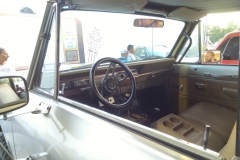
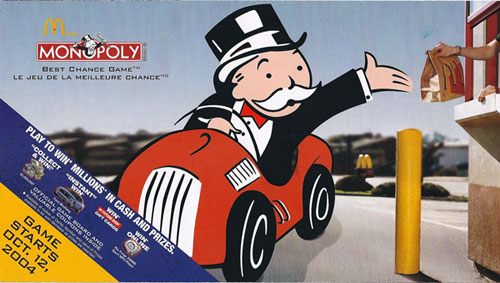
I love luxury, cruising in smug comfort like the Monopoly Man, checking on high-end properties at Park Place while zipping through Baltic Avenue with the windows up and doors locked. When you’re piloting a luxury sedan, you can’t help sneering at the unwashed masses trapped in Dodge Caravans, Toyota Camrys, and other depressing forms of mobility.
It’s a good feeling, but there’s more to driving than sitting in a fancy box and moving from place to place. It’s an act of assertion, freedom, emotion, and personal expression, at least in America.
And as far as expression goes, few sedans say “I’ve made it” like a full size Lexus. One could safely assume that the owner, at least when the LS430 was new, attended a respectable university and enjoys a secure, upper middle-class lifestyle as a doctor, lawyer, or banker. Unfortunately, aside from how they’re dramatized on Boston Legal or E.R., the average doctor or lawyer leads a quiet, responsible life free of rough edges or excitement… just like this Lexus.
On a checklist of what a luxury car should be (Lincoln’s old slogan), the Lexus LS430 encompasses quality, refinement, prestige, reliability, comfort, and retained value. All of the intellectual, practical, and reasonable questions are positively affirmed.
The LS430 also scores top marks in JD Power and Consumer Reports quality and dependability surveys, and with that honor the LS430 retains its value like nothing else.
A 2003 Lexus LS430 with 100,000 miles and every single option including radar cruise, “ultra luxury” with special wood, rear reclining seat, premium sound, and navigation is worth $21,000 in perfect condition, retaining about 30% of its original $71,000 MSRP.
A 2003 Cadillac Seville STS with 100,000 miles, also loaded, is worth $8000. That’s 15% of its original MSRP of around $55,000 with the technology package. Kelly Blue Book is being a bit generous to the Seville — realistically, 2003 Sevilles sell for $5000-$7000.
In the minds of consumers, the Lexus brand is a sure thing, a safe bet with no risks and high expectations of ownership satisfaction. The problem is, none of those expectations or criteria include driving pleasure. That’s my greatest complaint about the LS430.
It’s a stunning piece of craftsmanship with soft stitched leather on every possible surface, perfect build quality, deep and lustrous paint, perfect dependability, exceptional comfort, high market desirability, and surprisingly impressive fuel economy (26.5 mpg highway). It is, dare I say, the best mass-market car ever produced, with arguably higher quality than its successor, the LS460.
Unfortunately, it’s a bit of a bore to drive.
Effectively, you could argue that in this category of car, the notion of driving “fun” is irrelevant — and you may be right. On paper, at least, the pros vastly outweigh the cons, the only con being my subjective evaluation of how it looks and feels.
The responsible, well-educated, well-off folks who choose their cars based on checklists and pragmatic criteria can expect to be thoroughly satisfied. Nothing will make the “don’t pirate music and follow the speed limit” crowd happier than a Lexus LS. Trust me.
Otherwise, for those of us who make up 20% of the car buying public, the passionate enthusiasts with heart, soul, and gusto, the LS430 is dreadful. It’s a rolling tribute to rules, formalities, and order.
[Here comes my predictable Lexus bashing.]
EXTERIOR
It’s not ugly!
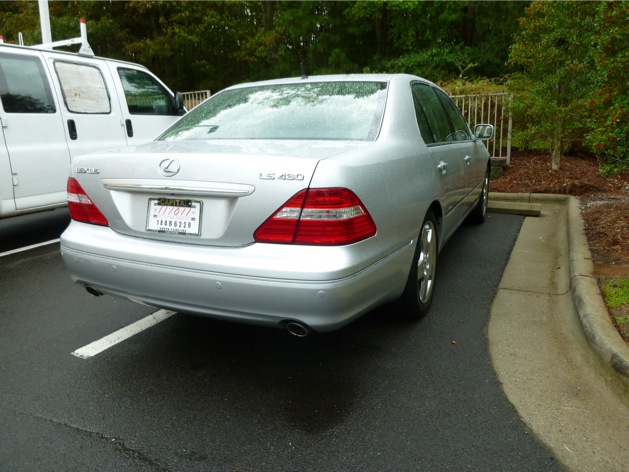
That’s a polite way of saying it isn’t pretty, like telling a girl with warts on her face that at least she’s not dead. While the original LS400 had somewhat of of a swoopy shape and a long, low body, the LS430 went the opposite direction with tall, lifeless proportions and dulled edges. There’s about as much design inspiration in this unimaginative three-box contraption as a Ford Econoline.
The added height does create significantly more headroom than the LS400, but it makes the car a bit more susceptible to wind at high speeds.
You can see in the sculpting of the tail lights and the roof how the LS430 was closely modeled after the legendary W140 Mercedes S-class from the 90s, but the S-class had more wedge-like proportions and straighter, more formal creases and lines.
The S-class says “I have all the power and money,” while the LS430 says “I work for the guy who has all the power and money.”
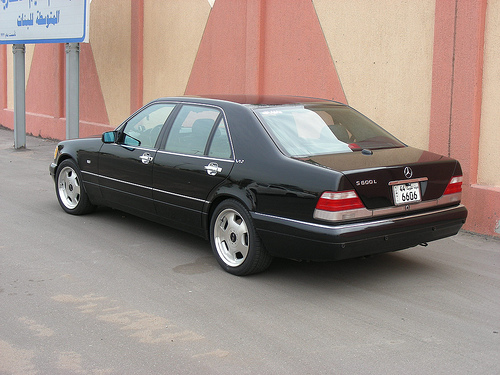
Panel gaps are impressively tight and the doors, if you close them gently, will quietly latch themselves shut (optional), just like like the S-class.
Apparently, Lexus intended to copy Mercedes-Benz but were afraid of being sued, so they rounded off the corners and edges to create something that looks, unfortunately, more like an elongated Toyota Avalon. However, thanks to the credibility gained from carrying the “L” badge on the trunk, it gets away with being plain.
It isn’t tuxedo sharp, nor is it a classic. It’s a gently carved box, efficiently shaped to maximize cargo and passenger room, and nothing more.
INTERIOR
We’ve established that the LS430 is a bore to look at. You might argue that looks are less important in the luxury game, as traveling in superb comfort is far more important. You would probably be right.
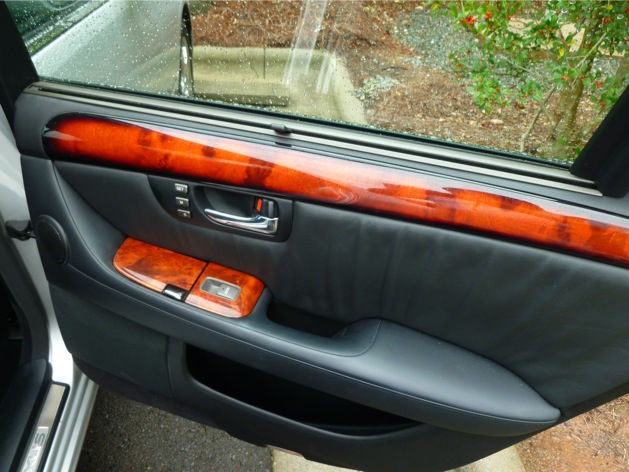
Every ounce of disdain I have for the way the LS430 looks and drives is made up for by two ounces of praise for its stunning interior. With the Ultra Luxury package, the LS430 receives burnt wood trim with faded edges that gracefully blend into the door, a beautiful effect on a black interior. Every single surface is lined with soft, thick, odiferously delightful stitched leather. When I say every surface, I mean every single surface.
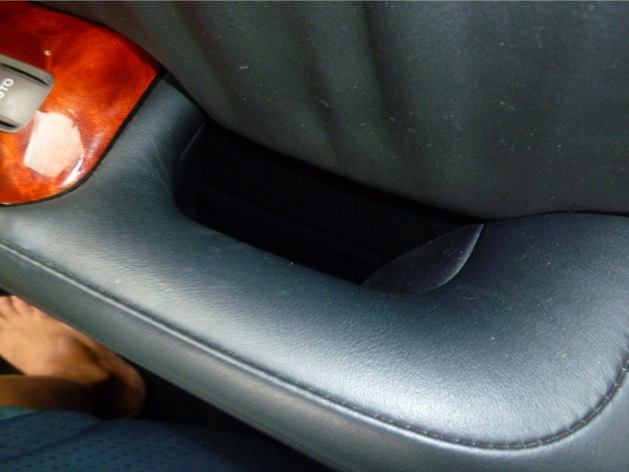
The insides of the door handles have the same high quality leather as the seats, door panels, and outer handles, all perfectly stitched and precisely installed.
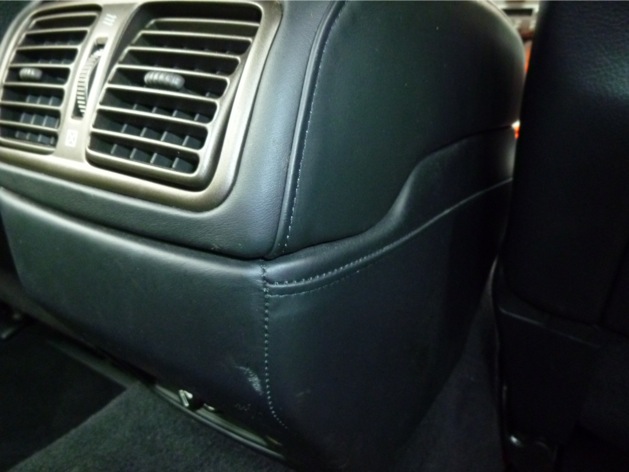
The rear vents have stitched leather where they could have easily gotten away with plastic or vinyl.
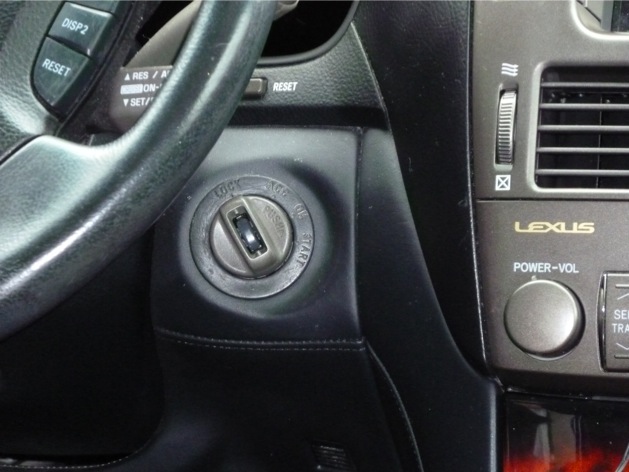
Even the ignition is adorned in stitched leather which is, by the way, keyless. You can walk up to the vehicle, get in, and turn the nub on the dashboard (a predecessor to pushbutton start) without ever removing the key from your pocket. Upon exiting, you close the door and push the little button on the door handle to lock the car.
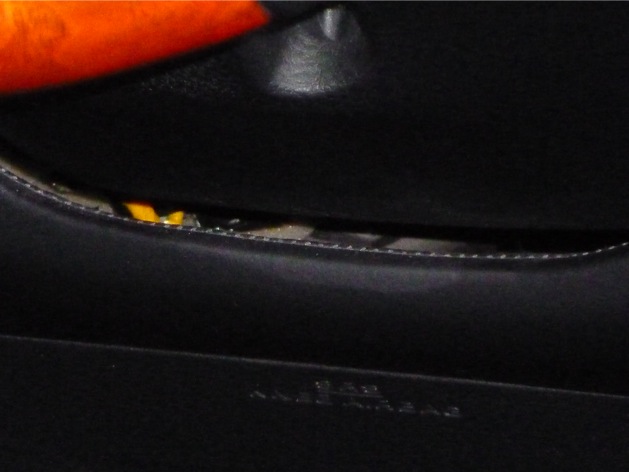
The knee board under the steering column (where no one ever looks or touches) is needlessly and delightfully done in finely stitched leather. An entire herd of grass-fed cows must have been sacrificed to create this stunning interior. It’s a Hindu’s worst nightmare.
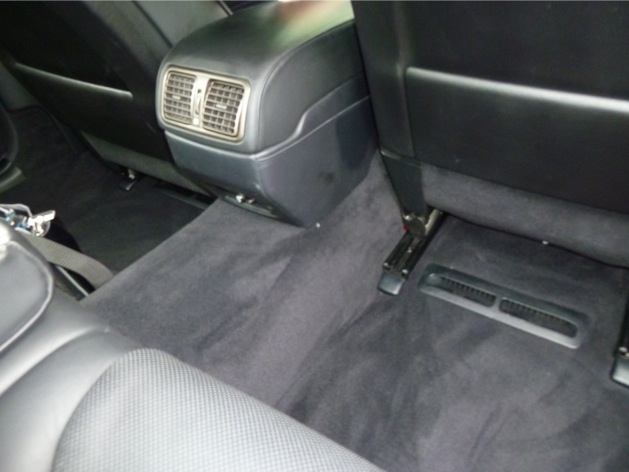
They didn’t neglect the floors either, covering them in thick, luxurious carpet that’s vastly superior to what’s offered in the standard LS460, the LS430’s successor.
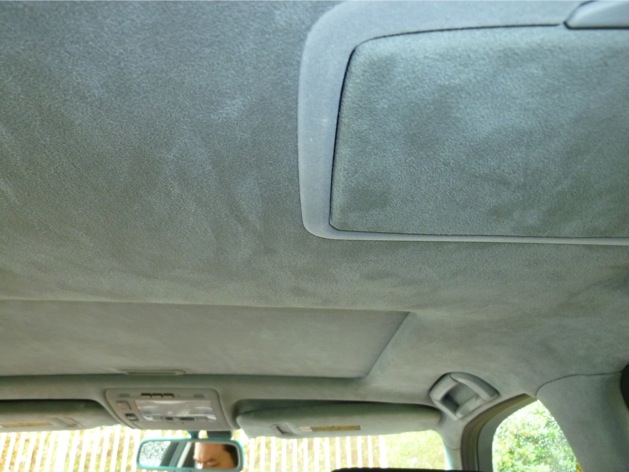
The headliner is made of real suede that also covers the pillars.
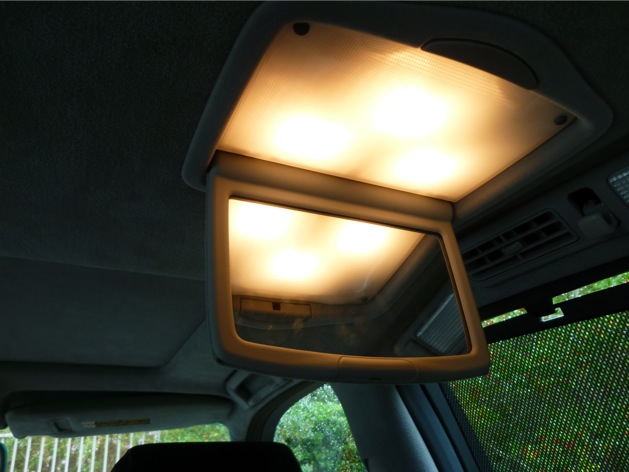
Rear passengers get their own lighted vanity mirrors, a feature that was fairly common on top-level Cadillacs built before the late 1990s.
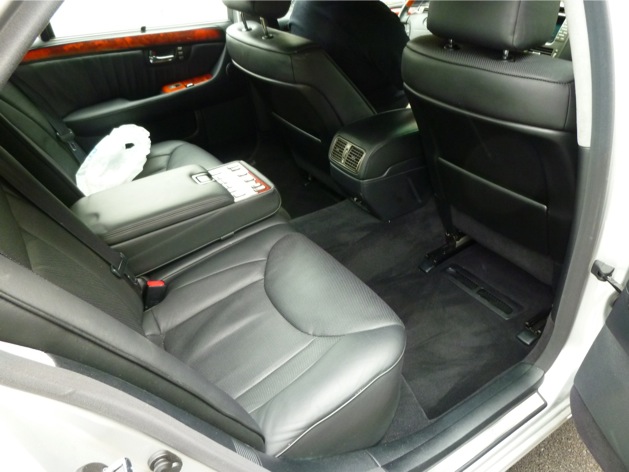
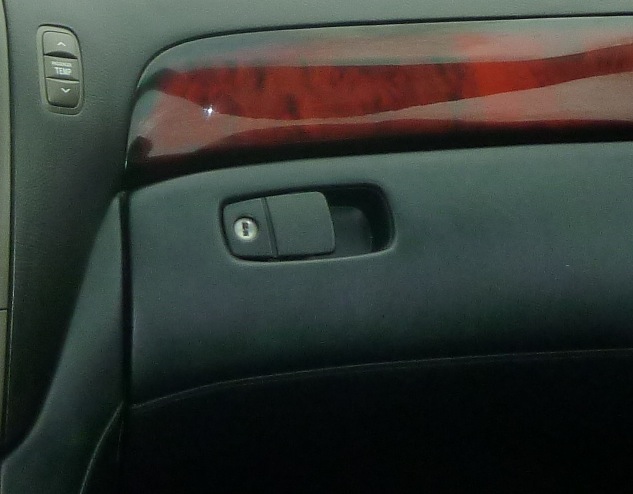
If you look very closely, you can see that even the inside of the glove box door latch is lined with stitched leather.
Unfortunately, a lot of these special features were optional. I drove a standard LS430 a year ago and found the interior to be well made but stoic, lacking in warmth with unexpected hard surfaces. A lot of the stitched leather was replaced by panels of vinyl and plastic, less like a Lexus and more like a Cadillac Deville.
The LS400 came with several of these niceties at no extra cost.
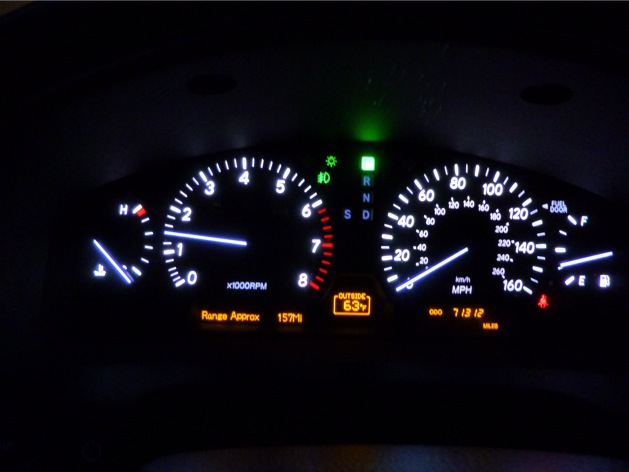
Electroluminescent gauges follow more than a decade of tradition for Lexus, and as always they’re clean, beautiful, and informative.
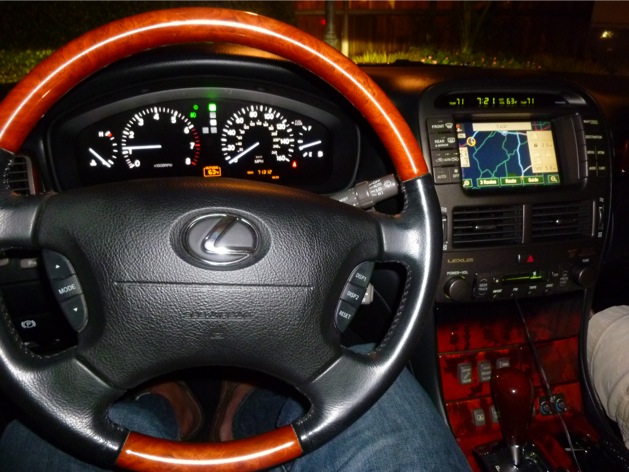
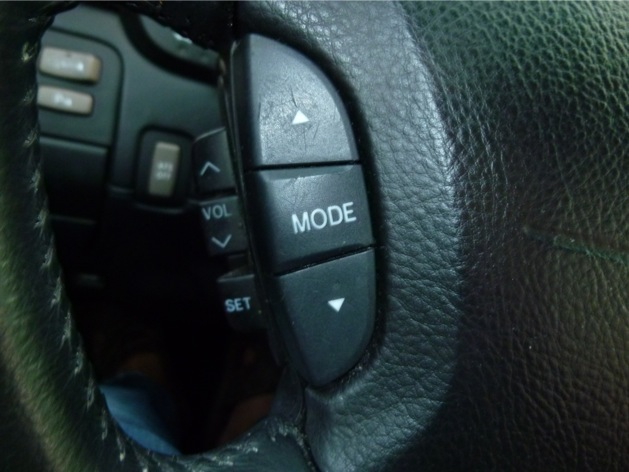
There’s a mess of buttons on the steering wheel. The left side has three layers of buttons, some for displays, some for phone functions, some for navigation, and some for the radio. You have to get to know them with time, because the layout is unintuitive. If you aren’t careful, trying to adjust the volume will prompt you for a voice command.
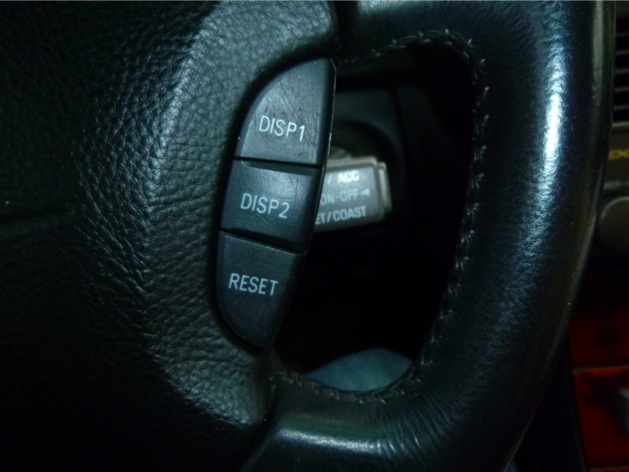
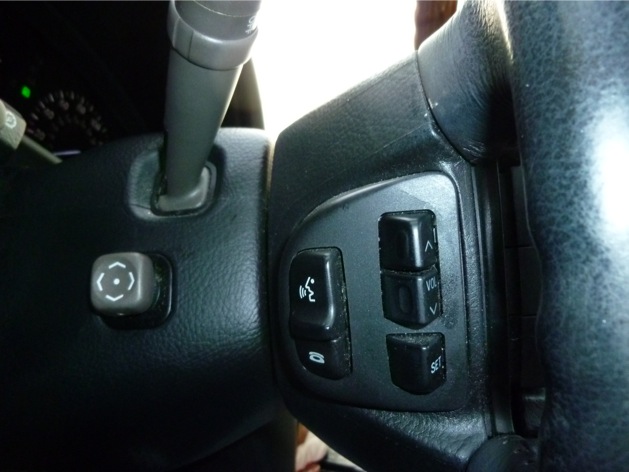
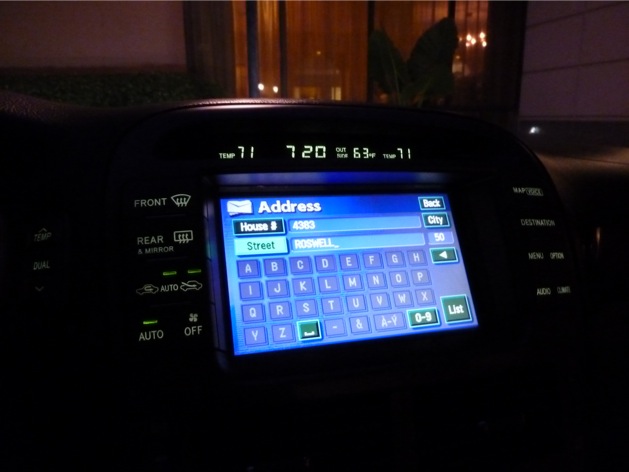
The navigation system was acceptable for 2004, certainly easier to use than what Cadillac, BMW, and Mercedes-Benz offered at the time, but accuracy is lacking. While it guided us somewhat successfully to our destinations, it didn’t provide sufficient warning of exits and turns. Guidance distance is adjustable on aftermarket navigation systems — I could not find a setting for this on the Lexus.
The Auto Recirculation button to the left of the display allows the car to choose on its own between ventilation and recirculation. When pollutants enter the environment, it automatically changes to recirculation mode to keep them out. Unfortunately this feature, which was also available on my 2001 Volvo S60, doesn’t work very well.

It isn’t often that I describe the smaller details of an interior before discussing the cockpit, but in the case of the LS430, the details are far more interesting. All of the controls are well within reach but the dashboard feels unusually short and high. For some drivers, that creates a sense of protection and security. For me, it comes across as old-fashioned, like it was plucked out of the LX470 SUV and placed into a sedan. I’ve become accustomed to longer, sleeker dashboards in longer, lower cars.
Because of this, the best seat in the LS430 is the back.
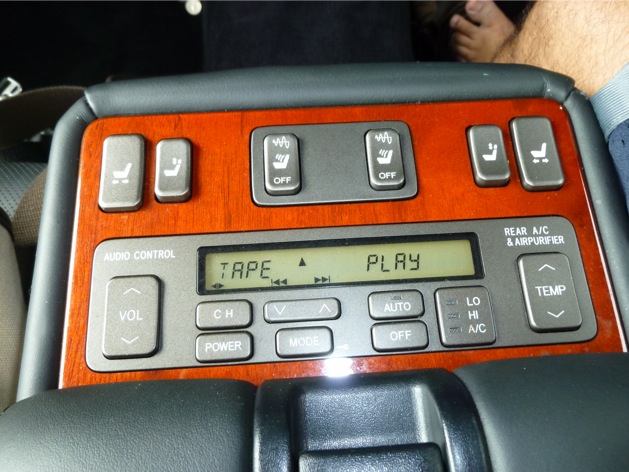
The top row has controls for power reclining, massaging, vibration, and headrest adjustment. The second row has audio and AC controls. Right above the door is an additional vent for more direct ventilation and air conditioning, controlled independently of the front. Unfortunately, rear audio controls are not separated from the driver with no headphone jacks available for private listening.
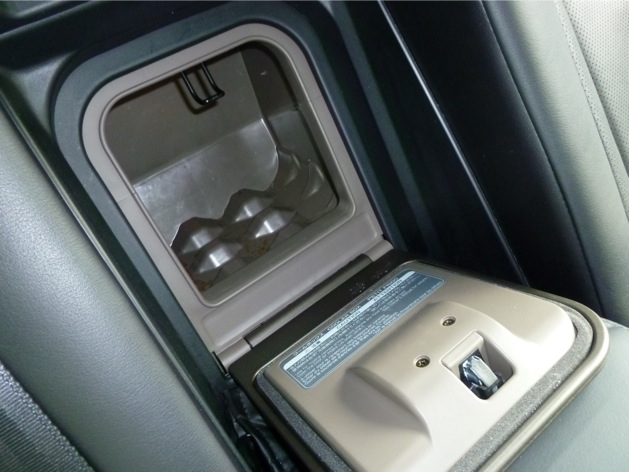
Behind the arm rest is a cooler for canned drinks. This one could use a cleaning.

Bonus: Rear windows have slide-up sunshades.
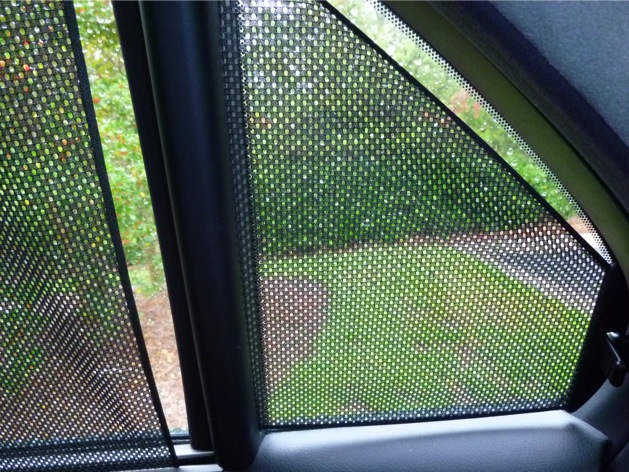
Super Bonus: The corner windows have shades too.
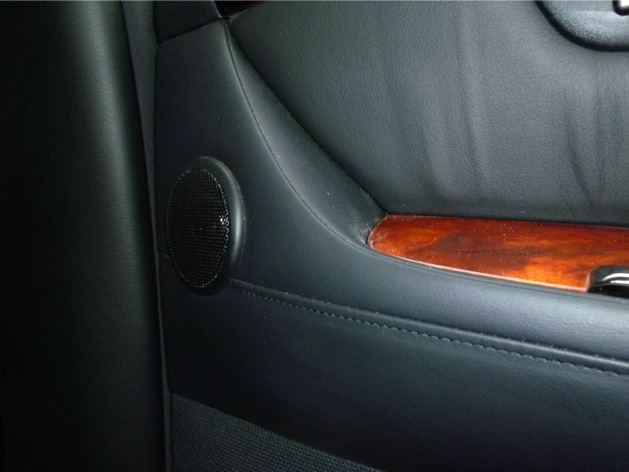
Additional tweeters and smart equalization keep rear seat passengers from being blasted in the ears. The Mark Levinson system, while unexciting, produces clean audio. It suffices.
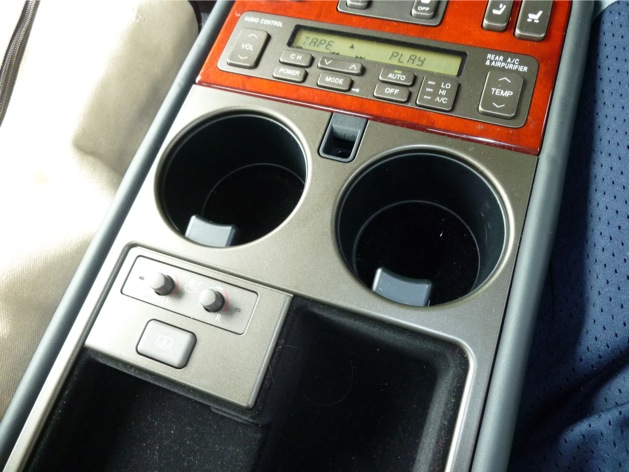
Opening the rear arm rest reveals two large cupholders, storage space, and additional controls.
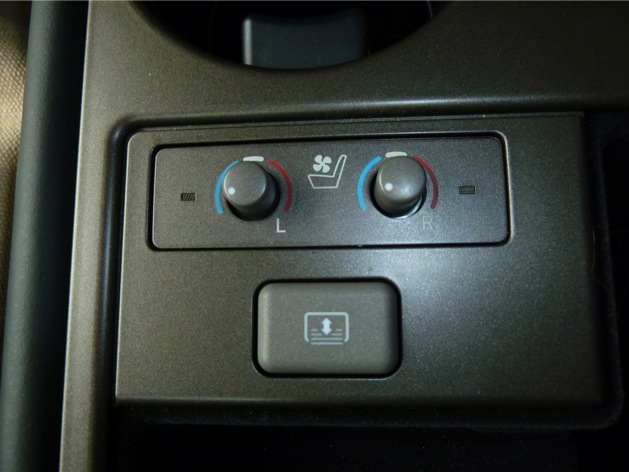
The two knobs control rear seat heat/cooling and the button controls the power rear sunshade.
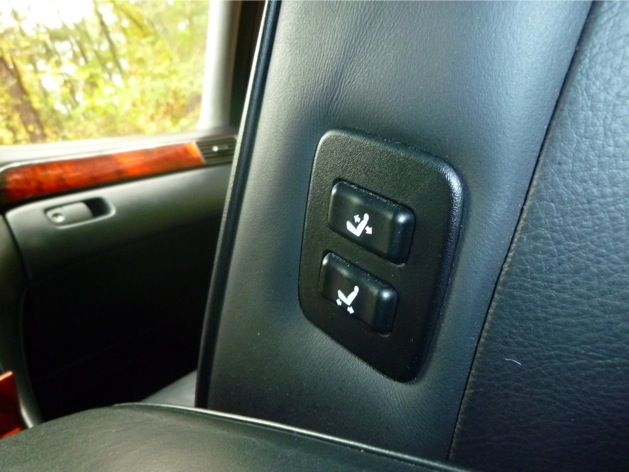
On the left side of the passenger seat are buttons that allow the rear passenger to move the front seat forward, creating more leg room in the back.
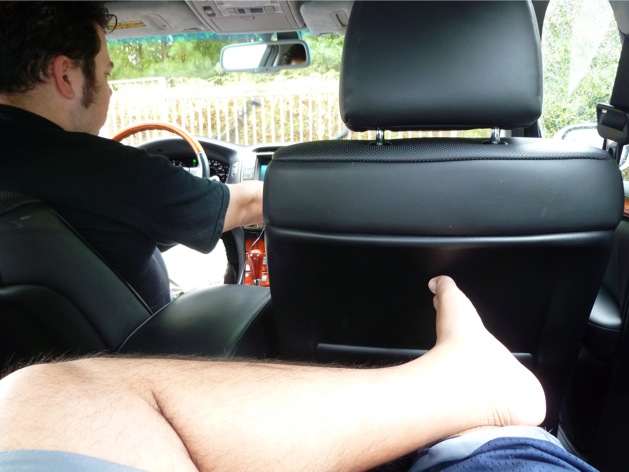
I had more space than I knew what to do with. Japanese market versions offer a front seat pass-through for the feet.
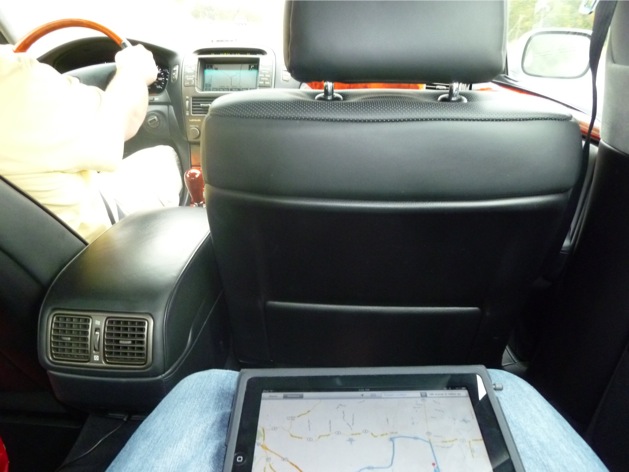
I spent the entire trip from North Carolina to Georgia to Tennessee to Missouri right here, browsing around on my iPad while dozing off on occasion.

Normally, I find it impossible to fall asleep in an upright position which makes it impossible for me to get any rest on an international flight. But with my seat heater on and the vibration function working on my lower back, I managed to doze off quite frequently, snoring loudly as we cruised through the south.
Thankfully, I had my iPod handy to drown out my friend’s collection of shitty Coldplay albums.
This is by far, without question, the most intensely detailed, well-appointed, and relaxing luxury car I’ve ever experienced.
But I still would never buy one. Allow me to explain.
THE DRIVE
Details can be impressive, and in medicine, law, and accounting they’re absolutely critical. In the act of motoring, however, they’re less essential. Yes, you have to have a precisely timed mix of air, fuel, and ignition for a combustion engine to function efficiently, and strict manufacturing guidelines and standards are required to build a reasonably dependable piece of complex machinery on a fast-moving assembly line.
But details, while obviously important, contribute nothing to a car’s soul or personality. With the LS430, Lexus is attempting to derive the car’s personality from its quantitative achievements. That’s like reading a book and admiring the quality of the paper and the number of pages rather than understanding the story behind it.
Would you eat pancakes that are perfectly round but taste like wood? No, of course not. Why would you drive a car that’s well made but lifeless behind the wheel?
While it may be unreasonable to entirely disregard the importance of details, it’s outlandish to suggest that the “Pursuit of Perfection” (Lexus’s slogan) is desirable in and of itself. Perfection in and of itself is boring, and being passionate about perfection alone is like being passionate about tree bark. Who cares about perfection if the thing being perfected is nothing of interest?
This isn’t to suggest that the LS430 drives like a Toyota Camry or a Buick Lesabre. It’s actually quite sophisticated.
In front of the well-appointed cabin is a 4.3L Toyota 3UZ-FE V8 sending 290 horsepower and 320 lb-ft of torque to the rear wheels. From what little of it I can hear, it’s a sonorous engine with amazing potential. The engineers have unfortunately chosen to silence this gem of a motor, keeping it out of sight and out of mind based on the belief that Lexus owners will take offense to the “crude” noises of air intake and exhaust rumbling. I suppose that’s true, and it’s a bit sad because aside from the finely crafted interior, that V8 engine is most impressive part of the car. It deserves to be heard.
The steering system offers a reasonable level of surface feedback although the wheel itself is the size of a screen door — you feel like a midget driving a school bus. Parking maneuvers are feather light while highway cruising is well-centered and accurate. Unfortunately, it feels numb and artificial while turning and taking curves, like the system is filled with molasses rather than hydraulic fluid.
A sport mode button tightens the steering and firms the suspension quite noticeably, and when I drove the LS430 I kept it enabled. Turning it off resulted in less precise steering and a somewhat mushy ride.
The six-speed automatic transmission was tolerable, a step above the clunky 5-speed in the LS400 but far from the responsive, silky perfection of GM’s 4-speed 4T80E in the Seville and Deville. With the Power switch enabled, shifts were less reluctant on kickdown and it felt more eager to change gears, but it still felt unnatural and hesitant. This land yacht had no interest in being hammered like a speed boat.
That said, speed is no problem. The LS430 soars to 60 in 6.5 seconds and finishes the quarter mile in under 15 seconds, competitive for any 4000lb luxury car. If you’re willing to put your foot down and put up with the slightly reluctant shifts, the LS430 will go head to head with the Cadillac Deville DTS, although the Mercedes E500 and BMW 545i can reach 60 in under 6 seconds. The LS430 would prefer to lope along at 70mph in the middle lane, cosseting its passengers in heat and soothing vibration. Lexus owners are unlikely to engage in stoplight races.
Where the LS430 shines, its ace in the hole, is ride comfort. The electronically damped air suspension neutralizes surface imperfections, turning annoying bumps and highway expansion joints in to distant, muted whispers. The body remains steady and linear over undulations, never feeling unsettled or queasy, nor is it squishy and mushy like the Lincoln Town Car (a review of that coming soon).
Credit also goes to the Michelin Primacy tires, grippy and sublimely quiet while offering adequately stiff sidewalls for spirited daily driving.
Whether that stable, neutral ride translates into lively cornering is another matter, one that’s somewhat irrelevant when talking about this kind of vehicle. The LS430 is no sport sedan, nor does it intend to be. It is, however, powerful and quick, not to mention superbly quiet with little wind or road noise. Refinement is everything to the Lexus brand, and the LS430 is a strong example of what Toyota could achieve in 2004. Unfortunately, excessive refinement has a tendency to dial out the fun.
The old LS400 was a more satisfying driver’s car.
CONCLUSION
The LS430 is an outstanding piece of Japanese precision, but accuracy doesn’t translate into enjoyment. Most drivers will interpret its numb, muted tendencies as peaceful and serene, a Japanese zen garden on four wheels, a place to neutralize stress and calmly transition from work to home. Passengers will be impressed by its array of comfort features and, in turn, may be impressed with the owner.
As a luxury object the LS430 excels, achieving levels of refinement never before seen in a global mass market automobile, but it lacks in interactive enjoyment and visceral pleasure.
My recommendation is to buy a black one, tint the windows, and hire a driver.
Fast Tube by Casper
RATINGS
Drivetrain: Rear-wheel drive, 4.3L 3UZ-FE V8, 290 hp, 320 lb-ft torque, 6-speed automatic
Economy: 16/23 mpg (achieved 26.5 on a road trip)
2011 Purchase Price: $21000 with 70,000 miles
Curb Weight: 3995 lbs
Problems: None.
Positives: Smooth, neutral ride. More luxury and comfort options than you’ll ever need.
Services: None needed.
Ride: 10/10 — No floating, wobbling, or mushing about. The LS430 turns the road surface into a sheet of glass.
Powertrain: 8/10 — A silky, robust V8 engine paired to a lazy transmission. 26.5 mpg is an impressive feat, so it scores a point for that.
Braking: 7.5/10 — Stops on a dime, but brakes are touchy and difficult to modulate. It’s too easy to jerk the car around with slight movements of the brake pedal.
Steering/Handling: 6.9/10 — It’s a big car and it feels like it. Steering offers sufficient road surface feel but seems numb in handling maneuvers. Body roll is ample.
Audio/Accessories: 9.9/10 — A plethora of features for the driver and passenger. More luxury than a first-class flight. The Mark Levinson system is competent but it pales in comparison to the stunning Nakamichi system that came with the LS400.
Interior: 10/10 — Plush, soft, and attractive. The layout is nothing interesting but the panels, switches, and surfaces are nice to touch. Infiniti has adopted the burnt-edge wood trim look in its current models.
Comfort: 8.7/10 — I wish the seat bottoms were spring-supported like the LS400 — they reduced long distance fatigue. The cabin seems a little bit narrow compared to the Town Car and Deville. You can’t sprawl out like you can in a Lincoln. Heated, cooled, and vibrating/massaging seats make up for those shortcomings, but you have to get the Ultra Luxury package to enjoy those features.
Styling: 4/10 — It doesn’t look ritzy, and that may be preferred for the typical low-key Lexus owner. If you’re the rebel dictator of an African nation, buy a fleet of these in black and stick some Toyota badges on them. You’ll blend in with traffic and avoid assassination attempts.
Quality/Reliability: 10/10 — It’s a Lexus, and it’s the best Lexus ever made, if you’re into that.
Overall: 9/10 — The right buyer will adore this car for its value, comfort, refinement, and prestige. I am indifferent to its joyless demeanor.
Really? I can’t believe this review. You’re bashing Lexus for attempting to ascertain perfection?!? I’m sorry, that’s preposterous! It simply makes no sense to ASSUME that perfection is inherently boring. The bottom line is that all automakers pursue perfection in one way or another. This could be in terms of achieving perfect safety scores, perfect fuel economy numbers or whatever. So taking this into consideration, it is much more logical to conclude that Lexus intended for the LS to be the perfect luxury sedan – not the perfect sports/luxury sedan or whatever joe somebody thinks it should have been. Quite frankly, that’s my problem with your review. You clearly asserted that because the LS does not provide its drivers with much of a sporty feel, then it is fundamentally not perfect. So hopefully, this clarifies my beef somewhat, although I will say that I was impressed with some other elements of your review such as all of the pictures and descriptions provided of the car’s specifications. Next time, I would urge you not to read your preconceived biases of what a car should feel or look or be like when reviewing a vehicle to as great an extent. Objective rather than subjective statements are always the most helpful and most interesting to read in my opinion. That’s all.
On the matter of objectivity, I hope that I don’t come across as a journalist! Journalists are confined to standards that restrict their freedom to share their personal points of view.
I and the readers of this blog come from a particular perspective of motoring, one that emphasizes design, character, and driving pleasure over reliability, resale value, fuel efficiency, and total refinement.
If it helps you sleep at night, I gave a generous 9 out of 10 to a car that I otherwise didn’t care for. This means that whatever Lexus did well, it did well enough to overcome its shortcomings by a wide margin.
Take that for what its worth.
I am a owner of a fully loaded 2004 Cadillac Deville DTS Nav/Massage seats etc. and I recently test drove a 2003 Lexus LS 430 and I held the LS overnight and I cannot even dare to compare the two vehicles???? The Lexus is by far a more precise built car over cadillacs flagship at the time. I have given the LS 430 the title THE ULTIMATE DRIVING MACHINE it outhandles the cadillac on dry and wet surface not to mention how smooth the tranny was compared to my cadillacs. I just believe you may have a sort of hate toward Toyota because this is such a flawless car when it comes to the LS’s interior and ride quality…. Oh by the way my 2004 Cadillac Deville DTS is for sale now contact chsparks@yahoo.com if interested
I’m not really into 2000-2005 Devilles, so I’ve never owned one, preferring the sportier Seville instead. Devilles from that era, depending on configuration, can be a bit boaty and their front end and interior styling lack definition.
The 2006+ DTS on the other hand is a pleasing car to drive despite sharing its architecture and powertrain with the old Deville. Reliability was much improved and driving dynamics are more precise.
I’ve owned a Lexus LS400, by the way. It was, in my opinion, more enjoyable than the LS430, due to its nicer interior (excluding the top-trim LS430 reviewed here), more communicative steering, superior Nakamichi sound system, and more intimate cabin. The old LS400 just felt like much more of a driver’s car while the LS430 feels like expensive furniture with wheels underneath.
Is the LS430 an “ultimate driving machine”? Not in a million years.
But is it an ultimate luxury car, short of something bespoke like a Bentley or Rolls Royce? ABSOLUTELY.
HEy guys,
I owned 1995 ls400 and it has 236000 km on it,I drove from toronto in -25 all the way down to baton rouge,luisiana, in +25 ,coming back to minnesota ,all in december and in 1 week,with huge snow in , all I want to say is that this car a little version of GOD, but,when it comes to ls430, what do you expect?, its like son of ls400,so it should be better and heyya, its better, I always adore the engine as I am mechanic,but 4.3 litre is a great engine. you can get 1000 hp from this engine by adding two turbo, but why?, we are talking about classic,luxery car that all you need is comfort and great ride.im obsessed with lexus( I do have lx450,1997,325000 km) but dont compare it with american one. If you want to get more horsepower,buy E55 AMG 2003 , in this case you have all luxery stuff with beautifull horsepower but good luck if it remains with no problem in less than 6 months.All my lexus have original engine with no mechanical issues, they both drives in snow in -30 and both drives in warm weather in +30, the only thing ive done was changing the timing belt. yes,the look of 2001 to 2003 might be not interesting,but still very sexy,lol
Thanks for the great review. It’s the first time I heard the Nakamichi was the better system. If the 400 faired better in crash tests I would probably pull the trigger.
So you would have enjoyed more noise, more bumps, harder steering, a check engine light, and maybe even a blown headgasket. Well fortunately for us Lexus buyers, Lexus DOSEN’T cater to the “imbecile” demographic. You’ve got GM for that. Stick to you “MUCH WORSE THAN AVERAGE ( as rated by Consumer Reports’ reliability rankings)” Cadillac. Idiot.
Did I just evoke -emotion- from a -Lexus- owner?
*Pats self on back.*
Lol! Nice quick response there lol. Yes u did. Dont be fooled by us Lexus owners. We got plenty of passion. That’s why we drive a Lexus to retreat to.
What’s funny about this exchange is that twelve years later I now own a Mercedes E-class. I’m now in my 40s and my values have changed.
I still keep and maintain a BMW 3-series convertible (at high cost) but I appreciate the Benz on cold winter days and long trips. The wide, spacious cabin, large chairs, marshmallow suspension, and easy steering are comforting after a long day.
Lately it spends most of its time on Turo but when I take it for a drive I notice how MB has come to emulate old-school Lexus. Ironic since Lexus got its start emulating old-school MB.
Perhaps the larger question is how we as first-world humans choose to go about enjoying life.
For typical “car guys,” it’s through the feelings of excitement and satisfaction evoked by being in control of a powerful, stylish, or agile machine. For others, the automobile is merely a means to an end, so they buy the nicest one they can afford with the highest resale value.
I don’t intend to live forever (maybe some of you do) and once I do get old I’ll likely require public transit or someone to drive me, so I’ll sacrifice dependability for driving pleasure while I’m young.
Additionally, as manufacturers match each other more and more on quality, reliability loses its value as a selling point. Lexus has dominated quality scores for more than two decades, but that doesn’t matter to the rest of us who enjoy cars as a hobby or a lifestyle, and as competing manufacturers offering more style and excitement come close enough to Lexus’s level of perfection, the biggest reason to own a Lexus loses its significance. Even Lexus itself has pursued performance as of late because of this.
Most importantly, I get more joy out of driving (and traveling) than I do out of several of life’s other pleasures. Anyone who doesn’t is reading the wrong blog.
Are u typing this while in your Cadillac, broken down on the side of the road that’s overheating? Excuses excuses. So long as your willing to turn a blind eye to reliability, GM has no problem cost-cutting on your dime. It’s just a shame that your lobbyist approach to lowered reliability and settling for that finds it way from a thought to an expression. I’m sorry, but I’ll take my purchase without the design flaw thank you very much.
This isn’t about defending Cadillac. That’s not what I sought to do and I’m one of GM’s biggest critics, especially GM’s upper management. I have tomes of books on beancounters like Smith and Zarella as well as champions of quality and engineering like Alfred Sloan and Robert Lutz. I can spend hours telling you about everything that GM has done wrong from 1908 to today and I’m a particularly vocal critic of Dan Akerson who believes cars are no different from soft drinks.
I gave the LS430 a generous 9/10 overall and praised its engineering, build quality, and comfort. You’re being far too sensitive.
The LS430 is a car I’d suggest to people seeking a no-brainer choice for a quality luxury car (family and friends, for example), but not fellow auto enthusiasts who expect more enjoyment behind the wheel, even if it comes at a higher operating cost.
On the other hand, I have never suggested Northstar Cadillacs to mainstream motorists, at least not without noting their pitfalls and mechanical hazards. Additionally, the muscular-but-refined CTS-V sedan, coupe, and wagon are powered by dependable small-block V8s that have been proven in racing and decades of refinement. The GM small block family truly is world class, offering gobs of power with less weight, cost, and complexity.
The Northstar hasn’t been in production for more than a year and the problematic version of the engine (prone to head gasket failures and case half leaks) has been out of production since 2004.
As quality gaps between manufacturers close, it becomes less of a consumer priority and erodes Lexus’s primary advantage. That’s far different from turning a “blind eye” to reliability. It isn’t a “blind eye;” it’s a diminished competitive advantage.
For example, if you were a winemaker and had access to a unique way of growing the world’s most flavorful and pest- and weather-resistant grapes, you’d hit the market the way Lexus did in 1990, building and maintaining your dominance for years. Now imagine your competitors catching up to you, growing grapes that are 90% as good while coming up with clever blends and new production methods to make their wines more interesting to drink at a lower cost.
Suddenly, your special grapes are no longer so special by comparison. Unless you differentiate yourself, you’ll lose your single competitive advantage. That’s the nature of doing business in a free market.
Kaizen (Japanese for “continuous improvement”) was an idea that originated with Richard Deming, a process expert who found no audience in the US so he took his ideas to postwar Japan, particularly Toyota. The modern notion of Kaizen isn’t just a focus on quality and consistency, it’s an all-encompassing need to constantly innovate by developing more stylish, more interesting, and more enjoyable goods. Toyota (and subsequently Lexus) had the quality in spades but lacked the design flair and driving enjoyment; now Volkswagen is the world’s largest and most successful automaker.
In the late 1980s, auto reliability used to be significantly more important than it is now, but others have caught up well enough for luxury buyers to give it secondary consideration in favor of other intangible and more emotional qualities.
Reliability is still a top-priority for non-luxury buyers, however, which is why the aging and soulless but stubbornly dependable Corolla is the world’s best-selling automobile.
Vanilla ice cream is popular for a reason. I have no problem with it. It’s a safe choice as an after-dinner treat and is wonderfully compatible with all kinds of toppings and recipes, but understand that people who -love- ice cream have more particular preferences for texture and flavor, even if it costs significantly more to enjoy.
I apologize for authoring such a long post. I love talking cars, economics, and business.
I revert back to my initial comment; your want for more noise, more bumps, and harder steering is not justified regardless what your passion for cars may be. if you have two cars that both give the same performance numbers but one rides harder, makes more noise, and has harder steering, then that car IS NOT FOR ME, AND I WOULD HOPE NOR FOR OTHERS EITHER. When I’m in my LUXURY car, which is what the LS430 is in spades,I want to be comforted and pampered in my COCOON OF SILENCE. I don’t want any effort in turning my steering wheel and I don’t want to feel any bumps. If you want to reminisce about your tractor,then go buy a tractor, and ride it till your hearts content. But don’t try to hide your quest for unrefinedment behind terms like “road feel”, “pleasant engine note”, “driving excitement”. No call it what it is, a harder ridding, noise making, stiff steering pill on wheels. Lexus can add all the performance it wants, just make sure they cater to my want of serene transportation, cuddled in refinement, luxury and silence. Theres no excuse for you to be whining to the contrary. None.
Your notion of luxury is rather dated and what you’re expressing is less of a defense of the Lexus way of designing cars and more of a preference for an older gentleman’s type of motoring experience. So be it.
In the modern era, you can indeed have your cake and eat it too thanks to technology and engineering. I’m getting ready to post a review of a 2009 S-class which, despite being larger than the LS, offers a superior combination of driving enjoyment and that sumptuous, traditional cruising environment. (Lexus does have it beat on throttle response and sensitivity, however.)
If you want to ride in a numb tomb, you’re more than welcome to! There’s a strange type of pleasure in doing so and there’s nothing inherently wrong with that, but compromise itself is the antithesis of modern luxury. There is no need to feel dead while you’re alive, not anymore at least, and capable automakers have moved the paradigm forward. Even Lincoln has discontinued the Town Car.
In earlier postwar America, luxury was a way of protecting the owner from his environment and for those who survived the poverty of the Great Depression and the violence of World War II or spent any amount of time riding in carriages while taking in the scent of horse manure, a silent, sealed cabin was ideal.
Now, the young and affluent raised in times of relative peace and prosperity seek both environmental isolation -and- visceral satisfaction, forcing manufacturers (including Buick!) to reevaluate the way their cars look, feel, and drive. Lexus replaced Cadillac as America’s top luxury brand in 2000 as aging boomers and members of ‘The Greatest Generation’ sought higher levels of comfort and refinement. However, the boomers and their predecessors are slowly dying off as BMW and Mercedes have both outsold Lexus in recent years, favored strongly by young up and comers.
Again, the issue here is more of a philosophical and preferential one. You like the older way of doing things. So be it, but total isolation does not necessarily have to come with a total loss of control and feedback. Take the latest luxury offerings for a spin (I drive and inspect anywhere from 30-50 cars of all kinds per week) and develop a deeper understanding for what the market has to offer. You may not like it, but you ought to acknowledge and be aware of it in a discussion about what defines modern luxury.
My philosphy it’s timeless, not dated. I’m also in my early thirties. I’m young. Once again you’re using coated terminology, “driving enjoyment”. Noise? Harsh? Stiff? Is that what you’re really advocating? Cause like I said, a car can post the best performance numbers and still be devoid of “driver enjoyment” while actually providing REAL DRIVER ENJOYMENT.
I’m not ready for a coffin yet, but when I reach that stage in life, I hope it has the tomb-like silence and build quality of a Lexus. 🙂
Until then, I prefer steering that communicates the road surface (also important for safety in adverse weather) and a shifter and throttle that offer a physical suggestion of what the road is doing. The transmission should also provide a noticeable feel when changing gears rather than blending it all into mush, characteristics that were once typical of American luxury cars, characteristics that even Lexus has slowly begun to abandon.
Feedback -> Control -> Satisfaction
There’s a place for the type of driving you’re into just like there’s a place for vanilla ice cream, but I prefer a blackberry gelato to a carton of Breyer’s. It’s not that I mind vanilla, I just prefer something more lively and complex.
Compromise is fine in older cars that exude character or come from an era where engineering capabilities were limited which is why I can enjoy a soft and numb 20 year-old Lincoln Town Car as much as I can enjoy a BMW 135i (recently drove one, blew me away).
However, modern luxury is about using technology to provide both comfort and visceral enjoyment without having to choose. Check out the latest ads for the LS460 Sport. Lexus is no longer using towers of wine glasses to sell their cars. They’re instead appealing to youthful and energetic professionals who are decades away from retirement and want some feedback and excitement. Fun and performance -are- luxuries, on par with comfort rather than in lieu of.
I’ll give you a bit of credit on one point:
When I deboard a noisy and uncomfortable flight and need a ride home from the airport, there’s nothing quite like sitting in the back of a large Town Car or Crown Victoria. In that case, I’m more than happy to be completely isolated from the world, but in that situation someone else is doing the ‘chore’ of driving.
Motoring is a source of mechanical and physical enjoyment for me where the more involving it is, the better.
For you, it’s a source of comfort and stress relief.
I’d rather relieve my stress with a Kentucky bourbon and a shoulder massage and use cars as a form of active excitement. The more the road winds, the better.
Sorry again for being so verbose. I find this topic interesting.
Petermerc
I previously owned a Mercedes S Class 320 CDI spec 3 (All the bells and whistles) Dark Blue with grey Nappa Leather. Although I was content with the Merc, – my Lexus LS 430 “Ultra Edition” is in a different league. There simply is NO comparison, – and I am thoroughly satisfied with my purchase. As an astute Lexus owner my passion is for perfection, which by definition includes satisfaction in knowing I have purchased quality reliability and an engine which provides ample power yet still returns 28.8 mpg on a run! Whllst the overall review was good, – I think there is a lot to be said in the way Lexus has approached their marketing and I am one very content owner. In short Lexus the finest best value Luxury car in the world period! Peter COYSH
Thank you Jesda for your honest, objective, insightful review.
I am the proud 3rd owner of my 2003 blk/blk LS430. She had $7k of work done to her before being sold to me for $8k. It’s got just over 100k miles, wears Michelin Primacy Mxm4’s and does NOT sport the ultralux package. Her juke stocks Disraeli Gears, Morrison Hotel, Doolittle, Check Your Head, Bleach, and Ritual De Lo Habitual. She’ll accommodate a cassette adaptor for the smarty but whines a bit when driven above 80mph. And She is SUCH A PLEASURE TO DRIVE. Any more information or tips for my 5-speed will be considered and appreciated. Safe travels and keep up the great work!
Jesda, please give yourself another pat on the back. This is a well done review. I realize this post is decades old but try driving an LS w/ the Sport package and Michelins Sports. Add a high perf aftermarket sway bar. No it’s not a BMW or comparable size car. It is however, a great combo of luxury and decent handling. I am confused by the lazy shifts comment. At redline under full acceleration, shifts are quick and precise. I’ve owned many cars (including German). I think of my LS as a “stealth” car. Motor along in understated comfort. Mash the throttle and enjoy the acceleration (especially when the tach hits 4k). Enjoy the arrow straight, nailed to the road feel at 130 mph. It does many things well. It’s versatile which is a lot of the fun. Agree, it’s a great idea to live a passionate life whatever you do.
Wow, are you serious? I think it’s a joke to be completely honest that you would drive a Lexus LS430 and “scoff” at someone in a Camry. Specifically, if someone alongside you were driving say, a 1992-1996 Camry fully appointed in XLE trim with Leather, then that’s no car to scoff at. Infact, the sxv10 is the only Camry built to Lexus levels of standards, based and influenced on the first generation LS400, something us engineers call “GD&T” or geometric dimensioning and tolerancing. Of course, the vast majority of these bloggers acting like “automotive experts” couldn’t solve a basic differential equation let alone answer a basic engineering question. That’s the irony of automotive journalism.
The appeal of a luxury good comes down to branding, detailing, and total look and feel. It’s part reality and part advertising-spun fantasy culminating in how the driver feels about his purchase. No Camry on earth has all of these qualities. No single metric changes any of it.
This is why business professionals handle market analysis, product planning, pricing, and sales — and you don’t.
Actually, that’s not quite true. I am a mechanical engineer but also versed in business and economics. I’ve studied TPS (Toyota production system) and all the underlying principles, including heijunka,5S, Kanban, Jidoka, RESPECT for PEOPLE, Genchi Genbutsu and Genba, Gemba, and much of my knowledge comes from self-continuing education through reading Toyota way books such as “Extreme Toyota: Radical Contradictions that Drive Success at the World’s Best Manufaturer”, “The Machine that Changed the World” and various other publications by MIT SLOAN and Harvard Business Review. Dr. Steven Spear and John Krafcik are two MIT kaizen pioneers I regularly follow. I actually was led here from “Carspin” forums, and was intrigued.
Interestingly, now that it’s 2022, the Lexus lineup has changed dramatically from when this was originally written. Design and performance are now front and center as brand values. Making a car well isn’t the same skillset as making a car interesting, though I’d argue that the Lexus brand today is as close as it gets to achieving both. In the era of LS430 that wasn’t the case.
Buyers are more demanding, the market is more competitive, and people expect quality and dependability to come with driving enjoyment. That is, after all, the essence of luxury — not having to compromise.
I’m going to reiterate what I said two years ago:
“The appeal of a luxury good comes down to branding, detailing, and total look and feel. It’s part reality and part advertising-spun fantasy culminating in how the driver feels about his purchase. No Camry on earth has all of these qualities. No single metric changes any of it.”
You can browbeat the public with metrics and so far as they contribute to fulfilling the greater brand image they matter. However, the luxury market, regardless of whether it’s cars, watches, leather goods, men’s suits, cruises, or fine dining, is far more sensitive to trends, intangibles, ideas, and emotions than what’s on paper.
There would otherwise be no reason to ascend beyond the Toyota Avalon. There would be no Rolex, no LV, no Bulgari, no Singapore Airlines first class bed, no Lexus, no Michelin star. That’s the thing with marketing and aspirational brands — qualities that can’t be measured with a ruler still have to be analyzed and understood to sell high end goods.
Short version:
The LS430 being an very well made car isn’t enough for everyone.
If a Savile Row suit has world class materials and stitching but fits like a boxy suit off the rack from Sears, it’s not going to be good enough for the most discerning.
This is a clash of values, not metrics.
And, if you’d like to truly argue with me, I’d ask you to define mathematically why Decibel levels in an automotive cabin have different ranges from 67-68 Db than 61-62 Db, even though they are both increments of 1
A very good article!
Years back, I would have thought the author was something of an apologeticist for the German luxury car industry, that Lexus’ combination of it’s elimination of NV & H and bulletproof reliability was a barrier so expensive to surmount and so out of reach for anybody but that ratified class of Japanese manufacturer that the Germans had to retreat to other superlatives, such as driving passion, road feel, suspension dynamics, and even vehicle ‘character’ in order to remain viable business concerns. It’s interesting to see how my views; and indeed the author’s views, have aged since he published this review some 11 years ago.
The review is almost without fault. It’s in no way brilliant, but certainly correct in all fronts discussed, even when critiquing the nature of The concept of perfection, and how it relates to cars. I find the other readers’ complaints far out of line; at no time was the author exalting something like the Cadillac motor division over the Lexus; indeed, the author was superfluous in his praise of the Lexus; gave the conventional American luxury cars their due praise, and if anything, was perhaps needlessly critical of the domestics, although even that claim can be questioned…
The only thing I disagree with is where the author says he’s not a journalist, as if being a journalist is a Bad Thing (or, a thing to be aspired to?).
I think the author would make a fine addition to to contemporary Auto journalists, such as Edmunds, or CR, as these concerns are sorely lacking as far as a general lack of bias is concerned (eg, CR giving Tesla low marks just because it’s discovered that Elon Musk wasn’t the liberal they thought he was, or, when testing the Town Car, Consumer Reports said of it’s interior noise levels, “our acoustic measuring equipment is telling us that the interior of the Town Car is more quiet than the Lexus LS400 interior, but the interior of the Lexus just SEEMED more quiet… “.
I have a 2021 Nissan Rogue and it’s nice but I might be getting one of these (black) and I’m so excited. I had a matador red mica ’06 GS300 prior to the Nissan and loved it, got a lot of compliments on it. I see these old LS430s around and just gotta have my own. I’ve been hooked on Lexus ever since my German-born grandpa bought a brand new LS400 in 1995.